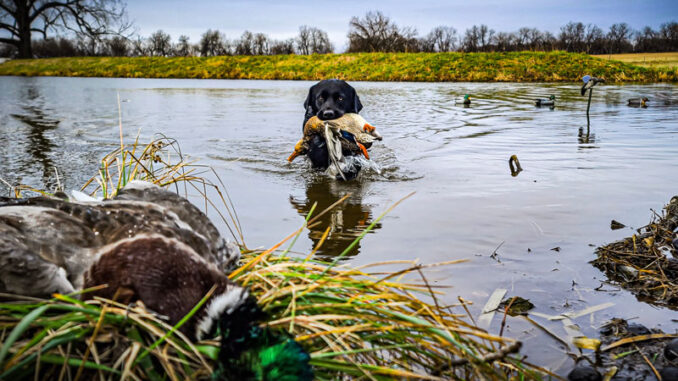
Minimum proposed changes to current hunting and fishing regulations were introduced to Louisiana Wildlife and Fisheries Commissioners at their monthly meeting Thursday, Jan. 4.
Commissioners unanimously adopted a Notice of Intent (NOI) for potential changes during a two-hour meeting in Baton Rouge. Louisiana Department of Wildlife and Fisheries (LDWF) Biologist Director Tommy Tuma reviewed the changes with the group.
“This is the smallest amount of changes that we have proposed at least since I have been doing this,” Tuma explained during his annual presentation. “It’s a yearlong process, and I’m excited to get started.”
Commissioners did not offer any amendments to the initial changes, but the group does have opportunities after the changes are published in the register. In February and March, commissioners can make conditional amendments based on public comment, according to Cole Garrett, legal council for the commissioners.
After the February and March meetings, there will be a public comment period in April for possible amendments. Afterwards, commissioners will make their final decision in May. The proposed changes will then lay over until June where they go to a legislative oversight committee and be finalized in July.
After several months of contentious meetings where the LWFC tried to address long-standing unresolved issues that have piled up over the past few years, including saltwater fishing limits, intrusion and damage from the pogie industry, bear seasons and an out-of-control wild hog problem, this was a fairly benign meeting. Although some steps have been taken, most of those serious issues still remain unresolved, but were not on this month’s agenda.
Proposed changes
There was a language adjustment to Area 5 and 9 deer seasons. LDWF proposed changing the opening date from the third Saturday of December and strike out wording, “before Christmas” in the season closing.
LDWF officials proposed wording changes to regulations concerning drones to “Use of drones for the recovery of wounded deer or bear. The use of Unmanned Aerial Vehicles (UAV) (commonly referred to as a drone) to aid in the recovering of a wounded deer or bear is prohibited.”
There was also a proposal to require a permit for tournament fishing at Bussey Brake WMA and a closing date change from Aug. 31 to Sept. 30 at Bodcau WMA for small game and waterfowl. Additional proposals included name changes for Camp Beauregard to Esler Field WMA, Fort Polk to Fort Johnson-Vernon WMA and for Peason Ridge to Fort Johnson North WMA.
LDWF proposed to add wording to the prohibition of motorized vessels at Wham Brake at Russell Sage WMA. They proposed adding the closure for all motorized vessels 14 days prior to opening day of duck and teal seasons, excluding youth and Veteran days.
White Lake WMA
LDWF Biologist Director Larry Reynolds gave an update on repairs at the White Lake Wetland Conservation Area (WCA). In February 2023, commissioners passed a resolution requesting $30 million to bankroll the repairs.
“The need hasn’t changed,” Reynolds said. “You all know we didn’t get the $30 million in the last legislative session. That changed nothing about the levees, nothing about the needs. It changes nothing about the quality of the habitat that needs protecting out there. That resolution that you passed in February of last year is no less important today than it was then.”
The 72,000-acre WCA located in Vermillion Parish is 74% freshwater and 26% agricultural land, according to Reynolds. White Lake is ecologically important to conservation efforts for associated fish and wildlife species and a critical refuge in an area of intense hunting pressure and high waterfowl harvests. It is also a foundation of the only remaining reintroduction program for the recovery of the endangered Whooping Crane population.
Levee maintenance
A major factor in protecting the WCA is the maintenance of levees. Gulf Intracoastal Waterway cuts through 12 miles of White Lake, creating 24 miles of levees. Twenty-two miles of the levee remains unprotected.
Hurricane Rita in 2005 and Hurricane Delta in 2020 caused breaches in the levee that separated White Lake and Unit 2 Refuge. These breaches caused inundation of the entire Unit 2 Refuge. Repairs were made, according to Reynolds, but high water and consistent south and east winds caused continual damage.
Officials also initiated a cooperative endeavor agreement in mid-April with Ducks Unlimited (DU) to rebuild a rock armor breach site at the southwest corner of Unit 2 and White Lake at a cost of $300,000 which DU agreed to pay, according to Reynolds. DU will conduct survey and drawings for permits based on preliminary engineering and design for nearshore breakwaters on the GIWW and north shore of White Lakes, and refurbishment of Unit 2 levels at a cost of $121,500 from LDWF.
New leaders elected
Later in the meeting, commissioners elected Brandon DeCuir as their new chair and Harlie E. “Gene” Reynolds as vice chair. DeCuir, an attorney, was appointed to the Commission in January of 2022. DeCuir is a lifelong Louisiana resident and member of the Coastal Conservation Association and the Louisiana Wildlife Federation. Reynolds was appointed to the Commission in March of 2021. A retired education, the lifelong resident of Louisiana resides in Dubberly. He is a former member of the Louisiana House of Representatives from District 10.